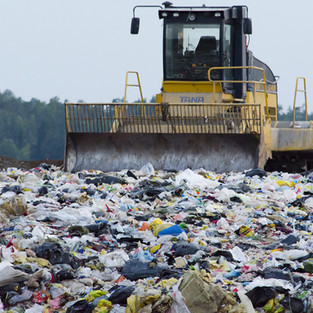Why should we recycle? Here are some interesting facts we have gathered for you about how much rubbish we produce in the UK and why it is important to start recycling to protect the environment.

'The UK produces more than 100 million tonnes of waste every year (that is 100 million small cars!). On average, each person throws away their own body weight in rubbish every seven weeks.
The average household in the UK produces more than a tonne of waste every year, that is 31 million tonnes per year, equivalent to the weight of three and a half million double-decker buses.
Every year we produce about 3% more waste than the year before. This might not sound much but, if we carry on at this rate, it means that we will double the amount of waste we produce every 25 years.
Paper
The average UK family throws away 6 trees worth of paper in their household bin a year. Paper and cards make up about a fifth of the typical household dustbin. About half of this consists of newspapers and magazines.
Two-thirds of paper is recycled, making it one of the main materials recycled in the UK. Each Christmas as much as 83 square kilometres of wrapping paper ends up in UK rubbish bins (the size of Guernsey!).
On average each primary school generates around 45kg of waste per pupil per academic year and each secondary school pupil produces around 22 kg. Of this, 53 to 59% is card and paper.
Recycled paper produces 73% less air pollution than if it was made from raw materials.
Glass
It is not known how long glass takes to break down, but it is so long that glass made in the Middle East over 3,000 years ago can still be found today. Glass milk bottles have been used an average of 13 times before recycling. In 2003, the recycling of glass saved enough energy to launch ten space shuttle missions!
Plastic
We produce and use twenty times more plastic today than we did 50 years ago. Most plastic shopping bags are used only once and a plastic bag can take more than 100 years to decompose. Every year an estimated 17.5 billion plastic bags are given away by supermarkets.
This represents over 130,000 tonnes of plastic - enough to cover an area the size of London twice with a layer of bags.
Cans
We get through 5 billion drinks cans every year. Each one could be recycled back into a new can, saving large amounts of energy, raw materials and waste. Recycling one aluminium can save enough energy to run a TV for 3 hours, Weight for weight, empty aluminium cans are worth 6 to 20 times more than any other used packaging material. There is more than 30 million pounds worth of empty aluminium drinks cans in the UK just waiting to be collected, cashed in and recycled. The UK uses about 12 billion cans each year - that's enough to stretch to the moon and back! If all cans in the UK were recycled, we would need 14 million fewer dustbins.
Each year, one person gets through 90 drink cans, 70 food cans, 107 bottles and jars and 45kg of plastic.
Food
UK households throw away between £250 and £400 of potentially edible food every year. Around 1/3 of all the food we buy ends up being thrown away. This is not only a waste of money and resources in growing, harvesting, packaging, transporting, storing and retailing but it also contributes to global warming by producing methane.
Other
It has been calculated that, before they are toilet trained, the average child goes through 3,796 nappies, most of which end up buried in landfill sites. We get through nearly 3 billion disposable nappies each year in the UK. Disposable nappies take 500 years to decompose. 7 million trees are cut down every year just to make disposable nappies.
It has been estimated that up to 80% of the contents of our dustbins could be easily recycled or composted. Other countries recycle a lot more than we do in the UK.
For example, Switzerland, the Netherlands and Germany recycle around 60% of their waste. Over 20,000 tonnes of batteries are sent to landfill sites in the UK each year. It takes 50 times more energy to make a battery than it gives during its life.' (CB Environmental, SERT)
Packaging at Gaia
We are conscious of our responsibility to the environment and to nature. For this reason, we have chosen eco-friendly packaging for your jewellery. Your piece will arrive gently wrapped in tissue paper inside of a pillow box. Both recyclable and eco-friendly. The supplier of our eco-friendly packages also plants a tree for every order that Gaia places.









Comments